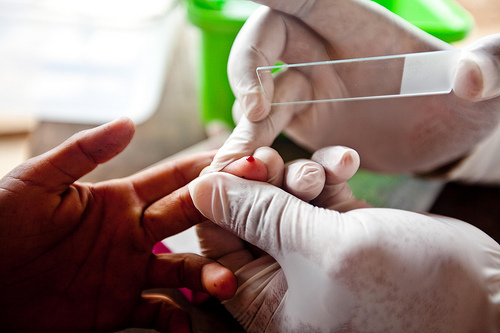This week's blog will focus mostly on malaria disease
progression and the methods used to diagnose if one has malaria. Some of the risks that
expose one to contract malaria are:
The most common and
the cheapest way to diagnose for malaria is by blood smear; the parasite
is readily detected by blood smears and
antigen tests. The test is done when a thick and thin smear is made from
a drop of blood. The smear is stained and observed under a microscope for
malaria parasite.
https://www.youtube.com/watch?v=VgDeKRC_1qk
CITATIONS:
Diagnosis of malaria -- everything you should know. (n.d.). Retrieved May 8, 2015, from http://www.thehealthsite.com/diseases-conditions/diagnosis-of-malaria-everything-you-should-know/
·
A person
resides in an area where several cases of malaria have been reported in
the past few days.
·
A person
is exposed to mosquitoes.
In the earlier
blogs I wrote how the malaria bacteria gets into human body when a mosquito
infected with malaria bacteria bites a human. According to the (CDC 2015) the
signs and symptoms of malaria do not show up immediately because there is
always an incubation period which can be from 7- 30 days.
When the signs
and symptoms starts showing which is the initial stage most people experience
flu-like symptoms such as fever, chills, headache, nausea, sweat, malaise (weakness
and discomfort), muscle aches and vomiting. If you are not well and have any of
these symptoms, get tested for
malaria without delay. If you
experience flu-like symptoms that have not subsided in 2-3 days it is always suggested
visiting a doctor as you could be at risk of suffering from malaria.
How to Diagnose:
 |
| http://www.zipheal.com/wp-content/uploads/2013/03/diagnosis_of_malaria.jpg |
The
presence of Plasmodium in blood confirms the diagnosis of malaria and also
differentiates between the four common types of parasite – Plasmodium vivax,
Plasmodium falciparum, Plasmodium ovale and Plasmodium malariae. It is
important to distinguish between these types since the treatment for each could
vary. The test should
be done when the patient is experiencing chills and fever and the reports of this test can be available
on the same day of testing(Health site 2015)
The video below shows laboratory work during the testing of blood for malaria.
CITATIONS:
Diagnosis of malaria -- everything you should know. (n.d.). Retrieved May 8, 2015, from http://www.thehealthsite.com/diseases-conditions/diagnosis-of-malaria-everything-you-should-know/
Disease. (n.d.). Retrieved May 8, 2015, from
http://www.cdc.gov/malaria/about/disease.html
No comments:
Post a Comment